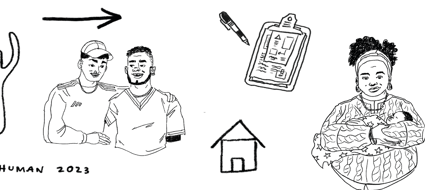How can professional curiosity help us to understand and identify executive dysfunction? We will explore how hidden disabilities and differences, including brain injuries and trauma, can influence executive function in the lives of people experiencing street homelessness in an upcoming webinar.
There comes a point where we need to stop just pulling people out of the river. We need to go upstream and find out why they’re falling in.
Desmond Tutu
When supporting people experiencing homelessness, it’s important to consider what is beyond an individual struggling, and the larger context in which that struggle appears. 85% of people who experience homelessness, offending and substance use will have experienced childhood trauma. This can impact executive functioning and therefore their ability/capacity to act out their decisions. Many report experiencing further trauma on the streets from violence, abuse, and sexual assaults.
The Disabilities Trust Foundation published research in 2012 indicating that almost half of people rough sleeping or in hostel accommodation had experienced serious head injury in their lifetime. This is likely to affect executive functioning.
When we assess capacity specific decisions, it is essential that we consider the person's ability to execute their decision, considering longitudinal evidence of executive dysfunction, and how this repeatedly impacts on one's ability on have the capacity to act on one’s wishes and decisions.
In an upcoming webinar, we will explore how we can use professional curiosity to identify and understand executive dysfunction. We will also focus on challenging unconscious bias, and the health inequalities, hidden disabilities and differences of the population experiencing street homelessness.
Attendees will hear the case study of 'Beryl', a woman who has experienced of homelessness and complex needs. This example will demonstrate how placing ownership on services optimises people’s ability to have the capacity and/or ability to act out the wishes and decisions. Focusing on strength-based practice, we will move the narrative from ‘what’s wrong with you?’ to ‘what has happened to you?’ and ‘what do you need?’
As social care and homelessness practitioners, it's important to to continue learning - both from people with lived experience and from peers too. A new co-produced radical safeguarding toolkit offers a new approach to safeguarding adults experiencing homelessness and multiple disadvantage, rooted in social justice. It explores principles of power, autonomy, solidarity and accountability in adult safeguarding.
The webinar will also touch upon the Mental Capacity Act, promoting longitudinal evidence of executive dysfunction, summed up with ‘saying one thing and doing another’. It will also demonstrate that the Care Act in conjunction with the use of an executive functioning wheel can inform support plans for people with hidden disabilities and differences reflective of executive dysfunction, by ensuring the emotional and environmental context is provided to do so.
Learn more about trauma-informed practice and housing and homelessness with Research in Practice resources.
A note on terminology
Practitioners in social care and homelessness services can use language differently and sometimes a word that has fallen out of use in one sector is still used in the other. We are committed to using language carefully and respectfully.
You can read more about this in relation to homelessness in the Radical safeguarding toolkit for homelessness.



